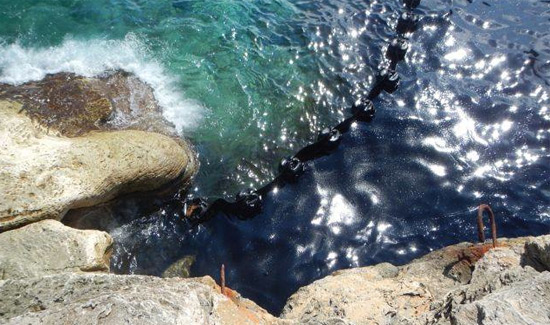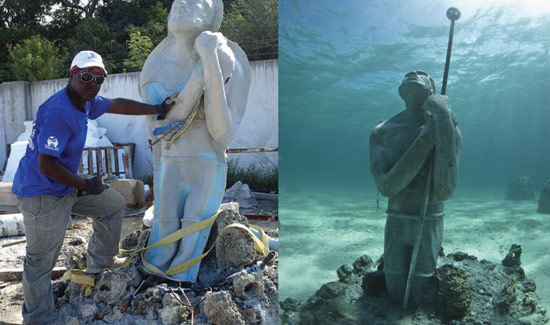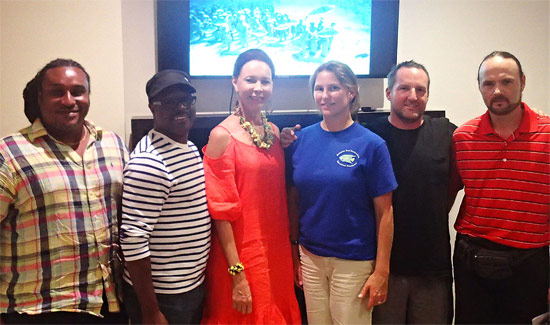
Clifton-Western Bays Waterkeeper organization launched as part of fast-growing international clean water initiative
The full extent of the damage caused to Clifton Bay by frequent oil spills and other forms of environmental degradation may soon be made clear, as international experts are working with concerned locals on water quality issues in this ecologically significant area.
The effort is being spearheaded by fast-growing local social and environmental advocacy group Save The Bays, in conjunction with the global Waterkeeper Alliance, a leading non-government organization (NGO) which coordinates more than 200 stewards of the marine environment, or Waterkeepers, who are assigned to rivers, bays, lakes and coastal areas around the world.
“Our waters define us. They are our source of industry and prosperity, the source of life itself in this beautiful country,” said Save The Bays director and proposed Bahamas Waterkeeper Joseph Darville. “We are committed to doing all we can to protect our seas, and the wondrous diversity of life they sustain, both for their inherent value, and for the benefit of future generations of Bahamians.
“There can be no better partner in this effort that the Waterkeeper Alliance, which stands behind every Waterkeeper in the world as they fight for their community’s right to clean water, supporting them with scientific research, strategic planning, and vital training.”
Darville said that while he has been nominated to be the official country representative for Waterkeepers, getting a Waterkeeper organization operational in the Clifton and Western Bays area will represent a huge step forward in the effort to protect and preserve the waters of The Bahamas.
“Clifton Bay is so important to the population of New Providence,” he said. “It has been a prime fishing ground for generations and is home to the island’s most significant reef system. The nearby mangrove forests are spawning grounds for countless species of marine life, which populate the bay and the surrounding areas, supporting our fishing industry and creating the conditions for countless economic opportunities for Bahamians.
“For years, this vital marine habitat has been under siege from oil spills and systematic toxic leakages from the industrial complex and power plant at the southwestern end of the bay. The government has failed in its duty to investigate this travesty, and as a result the offenders remain unidentified and there is no record of the extent of damage.”
Once operational, the Clifton-Western Bays Waterkeeper’s job will be to make up for the government’s failure in this regard, working to identify the level and nature of toxins present in the area. The studies are also expected to reveal the impact of other pressures on the bay, for example the unauthorized construction works undertaken at nearby Nygard Cay, which environmentalists claim have interrupted the natural flow of sand and damaged important reef systems.
During a recent visit by a group international environmental experts – many of them Waterkeepers – The Bahamas was warned of the grave effects the kind of pollution seen at Clifton could have on fishing stocks as well as the tourism industry.
“Contamination of water can come from many different places, and very often it is difficult to see where that contamination is coming from,” said Rachel Silverstein, the Waterkeeper for Biscayne Bay, Florida. “But in the case can see very clearly where this oil is originating, it is very point-sourced pollution and they should take action very quickly to clean it up and to stop the leaks in order to protect the marine environment, the clean water economy of The Bahamas, and the livelihood of the people who live in and around Clifton Bay.”
Marydele Donnelly, director of international policy for the Sea Turtle Conservancy, said: “The oil on the water was appalling and I can’t imagine what it must be doing to the marine resources, here. It’s been an ongoing problem. The power plant is filthy and here it is in one of The Bahamas most important cultural sites at the Clifton Bay Heritage Park.”
Alex Matthiessen, CEO of the Blue Marble Project, said: “The idea of having open oil spills in an area as beautiful as The Bahamas, that relies so heavily on tourism, on clean water, on clean beaches, on all kinds of recreational activities – the two just don’t mix.
“I guarantee you if there is too much of that kind of flagrant environmental pollution down here, you are going to start to lose foreign tourists and that’s the foundation of the Bahamian economy.”
For more on their visit Save The Bays Bahamas youtube channel: http://youtu.be/cR6E2YiLvGo
CAPTION: This photo, taken last week at Clifton Pier, shows oil seeping through a barrier presumably erected to contain it. The area suffers frequent spills and leaks of petroleum products and other other toxic substances, most likely from one or more of the nearby industrial plants. However, in the absence of any official investigations by government, both the source of the leaks and the identity of the agencies that sporadically attempt to contain them, remains unclear.



